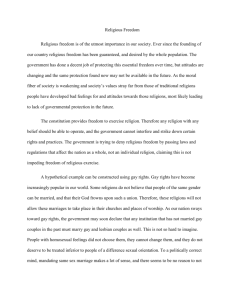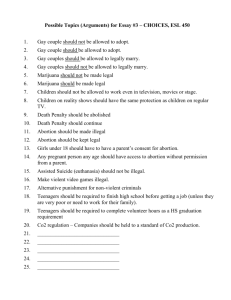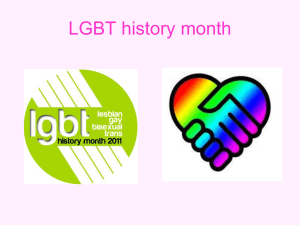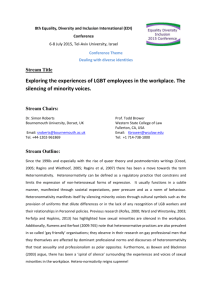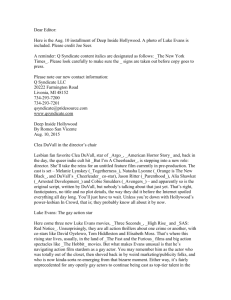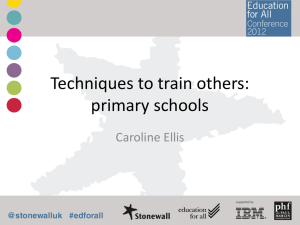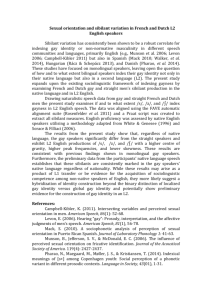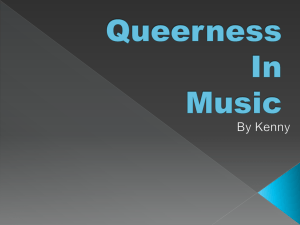Gay This, Gay That
advertisement
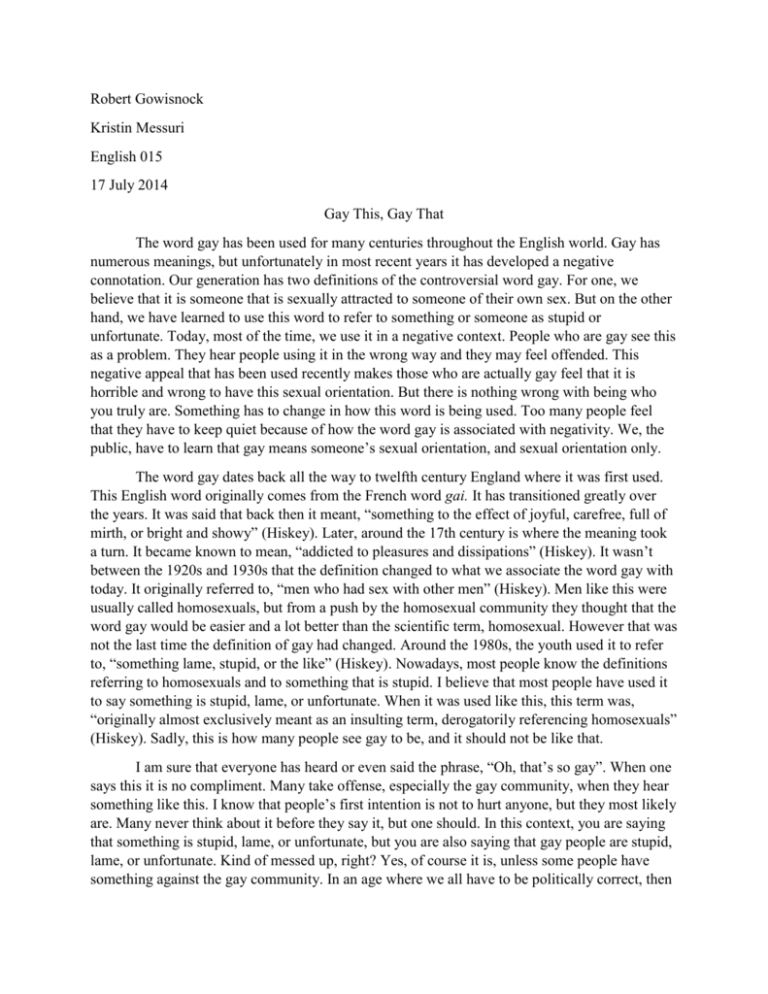
Robert Gowisnock Kristin Messuri English 015 17 July 2014 Gay This, Gay That The word gay has been used for many centuries throughout the English world. Gay has numerous meanings, but unfortunately in most recent years it has developed a negative connotation. Our generation has two definitions of the controversial word gay. For one, we believe that it is someone that is sexually attracted to someone of their own sex. But on the other hand, we have learned to use this word to refer to something or someone as stupid or unfortunate. Today, most of the time, we use it in a negative context. People who are gay see this as a problem. They hear people using it in the wrong way and they may feel offended. This negative appeal that has been used recently makes those who are actually gay feel that it is horrible and wrong to have this sexual orientation. But there is nothing wrong with being who you truly are. Something has to change in how this word is being used. Too many people feel that they have to keep quiet because of how the word gay is associated with negativity. We, the public, have to learn that gay means someone’s sexual orientation, and sexual orientation only. The word gay dates back all the way to twelfth century England where it was first used. This English word originally comes from the French word gai. It has transitioned greatly over the years. It was said that back then it meant, “something to the effect of joyful, carefree, full of mirth, or bright and showy” (Hiskey). Later, around the 17th century is where the meaning took a turn. It became known to mean, “addicted to pleasures and dissipations” (Hiskey). It wasn’t between the 1920s and 1930s that the definition changed to what we associate the word gay with today. It originally referred to, “men who had sex with other men” (Hiskey). Men like this were usually called homosexuals, but from a push by the homosexual community they thought that the word gay would be easier and a lot better than the scientific term, homosexual. However that was not the last time the definition of gay had changed. Around the 1980s, the youth used it to refer to, “something lame, stupid, or the like” (Hiskey). Nowadays, most people know the definitions referring to homosexuals and to something that is stupid. I believe that most people have used it to say something is stupid, lame, or unfortunate. When it was used like this, this term was, “originally almost exclusively meant as an insulting term, derogatorily referencing homosexuals” (Hiskey). Sadly, this is how many people see gay to be, and it should not be like that. I am sure that everyone has heard or even said the phrase, “Oh, that’s so gay”. When one says this it is no compliment. Many take offense, especially the gay community, when they hear something like this. I know that people’s first intention is not to hurt anyone, but they most likely are. Many never think about it before they say it, but one should. In this context, you are saying that something is stupid, lame, or unfortunate, but you are also saying that gay people are stupid, lame, or unfortunate. Kind of messed up, right? Yes, of course it is, unless some people have something against the gay community. In an age where we all have to be politically correct, then saying this definitely has to go. It could be compared to the word, “retard.” Most people would say that it is wrong to use the word retard negatively, like saying, “What a retard” or “That’s retarded.” It’s the same idea. We have accepted that it is wrong to say things like that, so why don't we accept the use of the word gay to say something is stupid, lame, or unfortunate is wrong as well? People look very dumb and inconsiderate when they say such a thing. I know that I get the sense that these people are just foolish and ignorant of other people’s feelings. Usually a person that says this will say they have nothing against gay people, but they most likely do. Being gay is not a choice, it is the sexual attraction that some people have to their same sex. It is not their fault that they are gay. They were born to like men if they are a man and women if they are a woman. A large number of these people nowadays feel that they have to hide their sexual orientation because of the way the public uses the word gay. People that are gay, that hear someone say, “Oh, that’s so gay,” feel that they are not accepted because when that saying is being used it is meant to be in bad way. This is why “Fear of rejection often plays a significant role in a person’s deciding who to tell or whether to come out” (Drescher). Thus making gay people feel that their sexuality is wrong and bad. This is why gay people struggle at expressing and telling who they truly are. This has also led to many psychological effects. They even go as far as hiding their true sexual orientation from themselves. It is said that, “Patients who struggle with coming out often have internalized anti-homosexual attitudes” (Drescher). This means that they deny that they are actually gay. They feel so threatened that they have to go this extent to feel a part of society. We always say “be who you want to be,” and for gay people to hide it is just wrong and unfair. We need to be more courteous and open to people who identify as gay. We have to learn to accept them, and know that they are not going to go away. They will always be here, and that is fine. We can do this by getting rid of using that word, “gay” in the negative context. I know that the next time I hear someone, like my friend say, “Oh, that’s so gay,” I will make a point to tell him to knock it off and be considerate to people who are actually gay. Everyone should do this as well. It only starts with one person, so everyone has to make the concerned effort to erase the negative meaning of the word gay. Once that is done the gay community would feel a lot better about themselves and welcomed. Work Cited Drescher, Jack, M.D. "The Psychology of Tyne Closeted Individual and Coming Out." Sequel. N.p., Fall 2007. Web. 21 July 2014. Friedman, Michael, Ph.D. "The Psychological Impact of LGBT Discrimination." Psychological Today. N.p., 11 Feb. 2014. Web. 21 July 2014. Hiskey, Devin. "How 'Gay' Came to Mean 'Homosexual'" Today I Found Out RSS. N.p., n.d. Web. 17 July 2014. Palmer, Liz, Regina Sewell, and Eric Hunter. "GLEAM @ MiamiOH." That's so Gay! N.p., n.d. Web. 17 July 2014.

